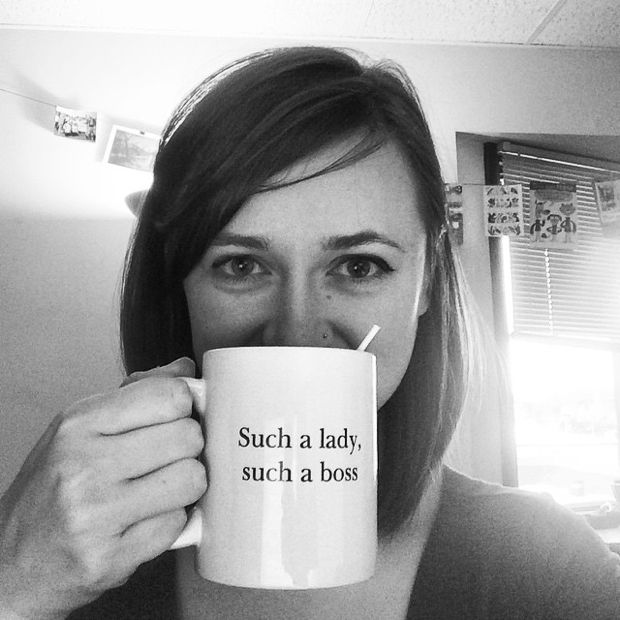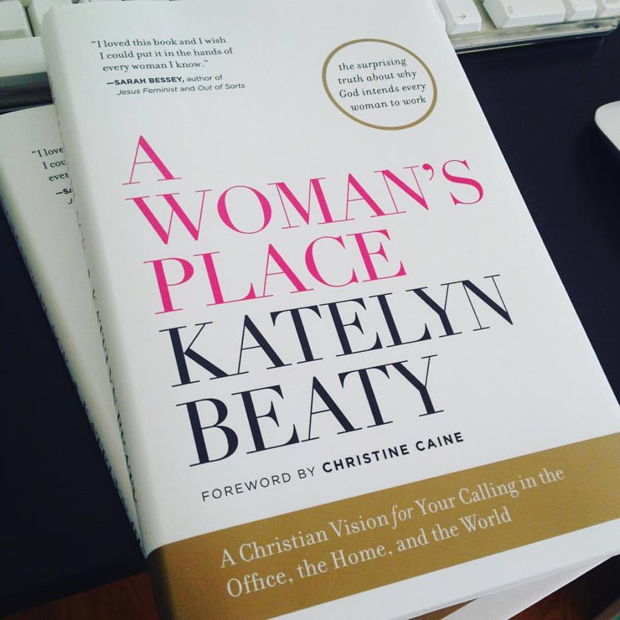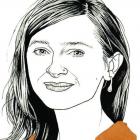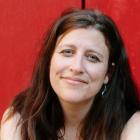Thank you for talking with us, Katelyn! Tell us how you became passionate about women and work, and how you decided to write this book.
Being at Christianity Today for several years, I have observed the conversation about the integration of faith and work picking up a lot of steam, and churches across the country taking the lead — churches like Redeemer Presbyterian in New York — as well as conferences and books all about the dignity and goodness of professional work and the ways that God uses our work for His Kingdom purposes. At the same time, I realized there was a need for women to participate in that conversation and for women to lead that conversation. I believe that there are unique questions or tensions that women in the work force face that are different from what men face. I wanted to fill a gap and address a need and to give Christian women a positive theology of their own call to professional work.
From a more personal perspective, I spent my twenties invested deeply in my career. When I was 27, I was engaged to be married, and that suddenly started to shift the way I had been thinking about my career. I assumed that once I got married, and presumably started having children, that my career or my professional work would really take a backseat not only in terms of my own time investment, but in terms of my identity — that being a wife and a mom would top or surpass being an editor. When that engagement fell apart, I looked back and realized how sad it was that I had been willing to put professional work and my career in the backseat, not only in terms of priority, but in terms of identity. And there are strong cultural messages and real limitations that women face in integrating something like the call to motherhood with the call to professional work. I wanted to both create a space for having those conversations in the Christian community and also start to imagine ways that women can integrate those dual calls and not feel that they have to choose one or the other in the way that I felt the need to choose.
It seems like in some ways, this book was born out of a place of deep pain in your life and it simultaneously was born out of a place of great success — being the first young female editor of a national magazine is, I would say, an unusual amount of success. In the book there is rawness and pain, but there is also so much confidence and beauty in being a strong woman. That really comes through — the humanity of it, but also the real potential that women have.
You're definitely right. The book is a reflection of my own — maybe what you call unusual — career success in my twenties, and also having some real loss and disappointment in my twenties. Both of those things kind of crashed into each other on the same day. In the introduction, I talk about a day in July of 2012 when my then fiancé and I decided not to pursue marriage and to end things. And on that same day, I got offered the position of managing editor of Christianity Today. I had no foreknowledge that that would be coming. So over breakfast I was offered this job, and over lunch, my then-fiancé and I decided to end the engagement. I’ve thought a lot about that day. I'm a cynical journalist and I often flinch at over-spiritualizing events, but it's hard for me not to think about that day as God's guidance in my life and calling me even more deeply into the work that he has given me to do. And calling it good, and not as a consolation prize like, "Sorry you didn't get married, but this will be good in the meantime." Really, this was an invitation to invest even more fully in the work at Christianity Today, and also to develop my own leadership skills and to step into a purpose and authority.

Your book has a lot of your story in it — and I think your story makes the book really human and approachable — but it's not a memoir. In fact, the process of the book — the way you went around and interviewed different women as you researched it — was unusual. The book is filled with stories of women and quotes from women: women of all different ages and backgrounds, women that are married with children, single women, and single moms. You include a broad swath of female voices in the book. I would love to hear more about the process of meeting with women, how you went about that, and how that informed how you wrote.
I spent about a year meeting with, overall, ten different groups of women ranging in size anywhere from six to 25 women. The reason that I made that investment was to flesh out my thesis. I think the journalist in me really wanted to show and not just tell, and also I think there is such a variety in how women integrate the call to work with the call to family life or in how they think about their own work, and I wanted to show that variety and diversity. You have women who are at the tail-end of their careers and thinking about the transition to retirement and wrestling with that, and you have a lot of women who are raising children, and there are several full-time stay-at-home moms included. There are women who are doing full-time work while raising children, then there are a lot of women — I would say the majority — who are doing some kind of combination of full-time parenting and part-time work; and then there are single women like me, and I think that these life experiences and seasons of life will necessarily inform the way that we think about work in a way that I don't always think is true for men. I think it's more common to meet a man who lands a decent job sometime in his twenties or thirties, has a family, and stays in that job for 20 or 30 years. That's just not achievable for many women. Oftentimes, women are stepping out of the workforce for a few years or going back to work part-time, or working from home and then coming back, or they're changing jobs because of the flexibility or the paid parental leave that's available. I was really drawn to that variety of stories and variety of experiences, and I wanted those stories and that variety to inform what I actually ended up saying.
There's a quote early on in your book where you say, "When cultural artifacts are guided only by men, our world is stunted." I had not thought about how very many of our cultural artifacts are created and guided by men. I would love, as kind of an introduction to the book's topic, for you to explain what you mean by that quote — what are some of the ways that culture can be stunted if it is guided only by male voices?
I start the book with these really big sweeping claims about culture and cultural change, and then I get more into the nitty-gritty. But basically, when all or most of our cultural artifacts are created by men (if they were to all or mostly be created by women, I would say the same thing), our world is stunted. This belief comes out of a theological conviction about the human call to cultural creation. I look at the Genesis account and the cultural mandate is given to both Adam and Eve, who together seem to be representing all of humanity in that passage. That conviction is coming out of a place of affirming the goodness of gender and the goodness of sexual differentiation. When the world that humans have created over time is only or is primarily guided by men, we're not living into the full cultural mandate we've been given in Genesis; there's something stunted about it.
One of the examples that I give in the book about how I see the world being stunted is looking at Hollywood. For all that we could say about the forces of Hollywood and the good and bad things coming out of Hollywood, it is the case that movies in our time are such a powerful cultural force and that they shape how we think about the world, how we experience emotions, and how we see other people. The majority of stories that we're getting in Hollywood are coming from men, and I think that shapes how all of us see the world. So if only or primarily men are being cast as the central figures in important stories, we start to think that, or suddenly believe, that the default human is a man and that women are there primarily to be pretty, or to have babies, or to be sidekicks in the main story. I think that, for better or worse, that has profoundly shaped how I see the world and how others see the world. I think it would be better if there was much more gender parity among the people who are driving Hollywood and presenting these stories to us.
My favorite chapter in your book is called, "You Are Female and It Is Good." In it, you quote Dorothy Sayers saying that when we relate to men, we typically relate to them as both human and as men, but when we relate to women, we relate to them as women solely. I thought that was a really interesting idea, and I'd love for you to talk about some of the ways you've seen that in the church or in culture.
In the book, I talk about how important conferences are for a lot of American evangelicals and looking at the number of male speakers versus female speakers. There has been conversation about this online over the past few years in terms of really pushing for more gender as well as ethnic diversity in our conferences.
On one level, I think, well, it's a more systemic issue. We have not reached gender parity even if we have more women on the stage, it's just more complicated than that. It's the way that authority and power work in any kind of institution. And at the same time, I think one of the reasons that you see some pushback to conferences that have only or primarily men speaking is that we understand that they're speaking about topics and issues that affect the whole church. Yet, they are coming at it from one gender’s perspective and we actually need both male and female perspective on issues affecting the whole church. Sometimes what happens at these conferences is there will be a women's panel to address something specifically affecting women in the church, as if women were a minority in the local church, which they're not in terms of numbers. Yet, in practice, if women are going to speak from the main stage, they usually speak about issues that are about women, but not about humans. That's why it goes back to that default assumption — Dorothy Sayers observed that, and everybody should read her essay, "Are Women Human?"
Then, this happened [at church] yesterday and I've been thinking about it a lot. The pastor — who is a wonderful man — was preaching on a passage in 1 Timothy, which is where Paul is encouraging Timothy to stay firm in the faith and to kind of press on. All of his pop culture references were about either LeBron James, or the NBA championship game, or about hunting. Of course there are women who love the NBA and follow sports and who go hunting. But I just realized that even the way that we come to the text of Scripture and the way that we apply it and make sense of it in our time is inherently gendered. I don't think that he was intentionally trying to leave out women, but that sermon would have been different if it had come from a woman. Actually, we need both to get the full message of the Gospel as it is applied in our daily lives.

One of the great points that you make in the book is the idea that women have always worked. You talk about how the Industrial Revolution affects our understanding of women and work — could you discuss that for our readers, and also tell us how you came to that realization?
In chapter four, I address a teaching that is so common. I think in a lot of American Christian circles people believe that women who are married, and especially women who are raising children, are called to be in the home in the private or domestic sphere, whereas men are called to go out from the domestic sphere to work, to provide economically for the family. From a purely sociological and observational perspective, I think that setup — that economic and relational arrangement — works well for a lot of married couples. So my intention is not to say, "Your family or your spouse and you should not organize your life together in this way," but I did want to strip away some of the spiritualizing of that model and show that that model, while it has worked across time in different places for many people, is not actually something that's found in Scripture. So I talk about the passages where Paul is telling women to be at home, to manage the household. And by the way, the language there that he's using there is very active. It's the role of a manager. It's not June Cleaver checking the roast while wearing pearls and high heels. Paul's describing a much more active and authoritative role.
I wanted to look at how we came to understand women's roles as being both home-based and kind of passive and not contributing to economic productivity. I look a lot at the effects of the Industrial Revolution and the way that the home, for most of human history, has also been the locus of work. So when we talk about work and home as being distinct spheres, those spheres were actually one and the same for most of history. It was only when technological innovation and the growth of factories and of cities really drew people outside of the home to make a living wage that we have this division between work and home. I really wanted to reinvest the home itself as an important locus of activity for both men and women, and also wanted to say that the pronouncement that women shouldn't work outside of the home is a bit of an anachronistic teaching because the home has been the center of work — certainly in Paul's time, and then for millennia after that. So again, I think that what we might call the “traditional model” works for a lot of families, but I don't really think that you can root it in scriptural teaching or in Paul's instructions to women.
We can think that gender roles are this pure theology that we pull straight from the text of Scripture, but, in reality, gender roles are worked out within cultural forces that are complex and that are beyond simply parsing Greek verbs. Things like war and industrialization and technology of all sorts have to do with our understanding of gender. You touch on this in your book and your conversation around privilege and working, and I would love for you to address the relationship between our understanding of women's roles and privilege.
I addressed the language of biblical manhood and womanhood. If we're going to talk about biblical manhood and womanhood, we have to accept from the get-go that these describe all men and all women for all time, right? And yet, if your definition of biblical womanhood revolves around a stay-at-home mom, you have to reckon with the fact that many women who are following God and obedient to him simply cannot choose to stay at home full time, oftentimes because of economic necessity. So that could be an individual family's reality, but also something like single parenting or the reality of economic inequality in our country and how that overlaps onto racial inequality. If your definition of biblical womanhood applies to a smaller and smaller set of women — a middle-to-upper-middle class, probably white, educated woman whose husband makes enough money to provide for the whole family — you're actually talking about a relatively small set of people. It's simply the case that many women have to work to provide for themselves and their families, and we have to reckon with that if we're going to talk about a kind of universal essence of womanhood. If it applies to a small set of women, it's probably not universal.







